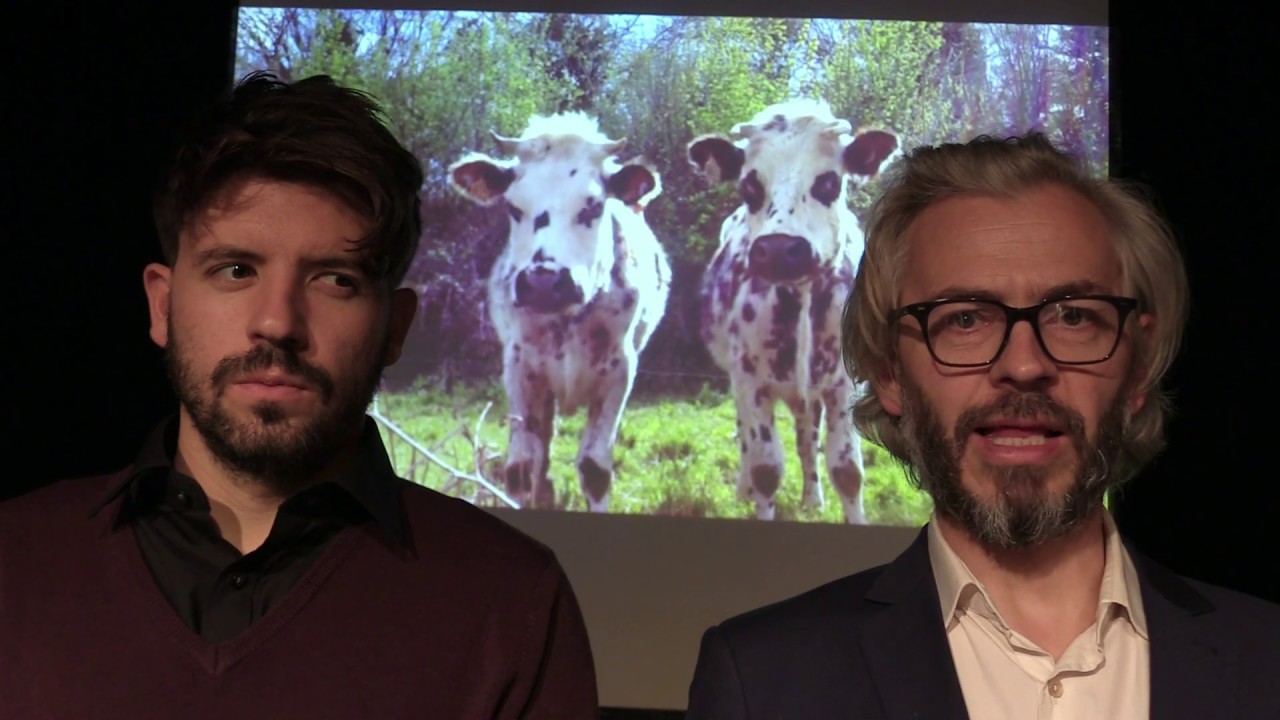He’s back! Welsh emerging artist Hugh Hughes, that is – the naively clever alter-ego of Hoipolloi co-founder Shôn Dale-Jones has been in the closet for six years, but is here dusted down and thrust forward to tackle the big questions of male identity, Welsh identity, changing social conditions in Welsh small towns, father-son relationships, bereavement, and grieving. Phew, no pressure then! Just so that expectations don’t rise too high, Hughes has decided that he will stay an emerging artist for the whole of his career, as that way he is free to fail. Sounds like a plan.
In The Ladder (‘an uplifting story about a downfall’) Hughes and Dale-Jones get a wee bit muddled up, as Hughes tells us that he is doing this show at the request of Dale-Jones, who has emailed and passed it on to him. Hugh Hughes shares the stage with his father, Daniel Hughes, who is dead. Daniel is played by an unnamed actor. (In another life he is Julian Spooner, of Rhum and Clay Theatre.)
So, here is Hugh and here is the dead dad Daniel. And together, they are going to work out how to tell Daniel’s story. The story of his death, but more importantly the story of his life. We learn that Daniel had a heart attack and fell off a ladder to his death, his whole life (no doubt) flashing before his eyes as he tumbled down. There’s video footage of the actual ladder, and also a nice animation, showing us the ladder and the falling father. The little tumbling figure can be stopped at any point, and this is what happens – time is frozen, and we get to hear dead dad Daniel’s thoughts and memories from that moment.
We are taken back to his childhood, sitting in the family grocery store, watching the black and green floor tiles dry. Later, he inherits the shop, taking good care of regulars such as Mary, who buys her apples there every day. All is fine and dandy, in an unassuming and low-key sort of way, until the new supermarket opens nearby…
Daniel’s reminiscences – often delivered in memory-snippet lists in which plasters and rubber bands and schoolbooks sit side-by-side in the childhood roll-call with teak music centres and Volvo estate cars – are augmented by scenes enacted by the two performers playing at role-playing. There’s also video footage, including a shaky Super-8 reel of Daniel’s wedding day (perhaps Dale-Jones helped Hugh Hughes by providing this from his own family archives? We’ll never know for sure!), and old East Anglia TV footage of an infamous local disaster, when a bus sank down into a hole in the road (the audience love this bit!). Apparently, everyone knew there was a chalk pit under the road, and no one worried about it too much until this happened.
The banter (cleverly scripted to appear to be spontaneous) between the two onstage characters is brilliant – slaughtering many a theatrical sacred cow as they go about the business of constructing a show in sight of the audience. There’s a notebook and pencil left at the front of the stage for any audience member who fancies contributing notes, and a wonderful tussle with an expanding table. (‘Physical theatre!’ says Hugh, moving into a lunge to prove his credentials – there’s a knowing laugh from those of us who are aware that Shôn Dale-Jones is Lecoq trained.)
A story at the heart of Daniel’s memories is of a schooldays incident with a spanner, revolving around a game of chicken with friends Glyn and John. What actually happened, and who was the actual butt of the joke, is disputed – and the incident has resonances in adult life when Daniel finds himself having to deal with his former friends (one now a bank manager, one working for the council) in his quest to save his shop.
This is such a clever and satisfying piece of theatre. A show about death that is thoroughly life-enhancing. A show that embraces so much about working-class male culture and small-town life, in a manner that is humorous but never cruel or condescending. A theatre show about making theatre shows: much meta-theatre disappears up its own backside, but here we get an always entertaining and accessible reflection on how to make theatre, and how theatre makes stories come to life. The show is directed and designed by the other half of Hoipolloi, Stefanie Muller – and she has, as ever, done a sterling job.
The company is based in East of England (Cambridge, to be precise) and it was wonderful to see them on home territory on the occasion of their 25th birthday. The Ladder, seen here at the Norwich Playhouse for its world premiere, is commissioned by Norfolk and Norwich Festival and other partners, and it is the third in the Loose Change Trilogy, following on from The Duke, and Me & Robin Hood. All three shows in the trilogy were presented in NNF 2019.
Here’s to the next 25 years, Hoipolloi – can’t wait to see what you have up your sleeve for your next show! And may Hugh Hughes never fully emerge – we love him just the way he is, an Everyman who is a wonderful work-in-progress.

